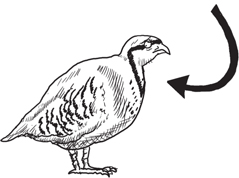

Contents
A note to help you: 
In this book the word root means the origin of a word where it sprang from, like the roots of a plant.



I still remember the moment I became excited about WORDS . It was on the day I discovered that my favourite supper a huge helping of lasagne with oodles of bubbling cheese was actually named after a toilet. Of course I was completely horrified, but I knew I had to find out more.
Once Id tracked the story all the way back to Roman times, and understood quite how a chamber pot came to mean the Italian dish we know today (you can read the story later in this book), I discovered another amazing thing once you start digging into the words we use every day, you just cant stop. Just how did an earwig get its name? Why do some of us find the idea of kissing under the mistletoe completely YUCKY (its not what you think!)? And why does the idea of a partridge in a pear tree make some of us snigger?

It turns out that English is packed with stories like these, adventures full of BLOOD, POISON , GHOULS and MONSTERS even FARTS and PANTS . And the best part is that they are all under cover, hidden below the surface its up to us to go and find them. In fact Id be thrilled if, like me, you too become a WORD DETECTIVE and begin to explore the weird world of words yourself.

Though not in the usual sense of the word just wait!
There are many, many more surprises out there waiting for you, and a lot of them are hiding between the pages of a dictionary.
Who knows: if you love the adventures as much as I do, maybe one day you too will sit in Dictionary Corner , spreading the word!



I ts a very weird thing to say, but if we lose our voice with a cold and sound a bit croaky, we sometimes describe it by saying, I have a frog in my throat.
Where can such a silly saying come from?
Many centuries ago, medicine was a lot more basic than it is today, and some of the CURES people tried were VERY bizarre!

And so if, back in the Middle Ages, a person had a sore throat, the doctor would sometimes put a LIVE FROG head first into his patients mouth! The idea was that the frog would spit out a substance that would then draw out the infection from the poor patients mouth!
According to some, there was another superstition around at the time that drinking water sometimes contained frogspawn thats frogs eggs surrounded by transparent jelly eurgh! People believed that frogs would grow inside the body, and make you hoarse or gag when they tried to jump out of your throat.
Either way, I may never use that expression again. In fact, Ive turned the colour of a frog just thinking about it!
P.S. Poor frogs, they didnt have a very happy life in those days (see How to be a geek!, for another example).


O nce upon a time, people believed that a certain insect could find its way into the human brain and live there quite happily.
Was it:
A. A cockroach?
B. An earwig?
C. A spider?
ANSWER: B. The earwig!
It was once widely believed that earwigs could creep into a sleeping persons ear, and then scuttle up to their brain where they would live and breed. This ancient belief explains how the insects got their name. The Anglo-Saxons, who spoke Old English over 800 years ago, called all insects wicgas, which sounded a bit like widgers and which is related to the word wriggle . When they discovered the earwig they called it ear-wicgas, or ear-insect.
There are lots of words for earwig around the UK. In Yorkshire the earwig is called a forkin robbin (the fork part refers to their two pincers , while robbin was a popular nickname), and in Cheshire they are known as twitchbells.

Did you know
that the word spider comes from a very old English word meaning to spin because a spider spins its webs. It was a spinner , just like, in fact, the spinster an old-fashioned name for an unmarried woman because in years gone by spinsters would spin yarn for a living, having no husband to help bring in money.


T heres nothing like eating a hot, steaming stew on a cold winters day. Some of you may not like the idea of a stew particularly a school one and what Im about to tell you probably wont change your mind!
Thats because, believe it or not, the word stew is connected to a terrible disease that causes fever and a rash, and that can be
... DEADLY!
That disease called typhoid or typhus is a horrible one that still occurs in some countries. Its name comes from a Greek word meaning steam , referring to the fever caused by the disease, as well as a horrible confusion of the brain . The idea is that steam is inside your head, stopping you from seeing clearly.
But where does stew come in, you ask? Well, the Romans borrowed typhus from the Greek and turned it into their own word, extufare , which meant having a steam bath ! The word became stew in English, and originally described a public bath or hot tub. Eventually a stew was used to describe food that had been steamed in hot liquid. If you think about it, the steam coming off a plate of hot stew is a little like the steam rising up from a very hot bath (full of water, not meat and vegetables!). But perhaps try not to wash yourself in one.
Next page




























